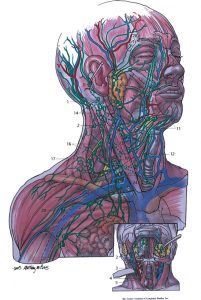By Theresa Lynch, M.S., OTR/L, C.L.T.


Lymphedema is a condition in which lymph fluid accumulates in the soft tissues resulting in swelling. Lymph fluid is part of our immune system and consists of proteins, chemicals, white blood cells and cellular debris. Lymph is normally formed as fluid seeps out of small blood vessels, transported through lymph nodes and eventually returned to our bloodstream. When this system is interrupted by removing lymph nodes, cutting lymph vessels or scarring capillaries during the treatment of cancer the fluid cannot flow in its normal pathways and can cause a build up in the tissues, inflammation and fibrosis of internal and external structures, resulting in lymphedema.
Head and Neck cancer survivors are at a high risk of developing lymphedema and is present in 75% to 90% of survivors
Symptoms of lymphedema
. Heaviness or fullness
. Visible swelling
. Decreased range of motion in mouth, neck, shoulders
. Pain, soreness in neck and shoulders
. Difficulty swallowing (dysphagia) solids, liquids, pills
. Feeling of something stuck in throat
. Scarring, fibrosis (hardening of skin and tissue)
Lymphedema typically presents as diffuse swelling in the neck and may be more pronounced over an incision and under the chin, jawline and cheeks. Trauma to head and neck can cause decreased range of motion of jaw, neck and arms externally. If internal, it can cause changes in swallowing, voice and breathing. If left untreated chronic lymphedema leads to worsening inflammation and permanent skin changes or fibrosis of the tissues.
How is head and neck lymphedema diagnosed?
Lymphedema is a clinical diagnosis but there are a number of objective scoring systems that your doctor may use to determine the severity of it.
One of the commonly used grading systems is the MD Anderson Cancer Center Head and Neck Lymphedema Scale. Standardized face and neck measurements are also used to track progression and/or treatment success. It is ideal to get pre-surgery measurements as a baseline. Internal lymphedema may be evaluated by your physician using an endoscopy.
Stage Exam Findings
0 No swelling, but a sense of heaviness in the neck
1a Visible mild swelling without pitting. Reversible
1b Visible mild swelling with pitting. Reversible
2 Firm pitting swelling that is irreversible. No visible tissue changes
3 Irreversible tissue changes with scarring and fibrosis
How is head and neck lymphedema treated:
The gold standard for treatment of lymphedema is Complete Decongestive Therapy CDT, which has 4 components. 1) Manual lymph drainage MLD – is like a massage to direct the flow of lymphatic fluid to intact lymph vessels and nodes. 2) Compression bandaging to keep the swelling down. 3) Skin Care to the effected area to prevent infections and 4) Exercises to promote lymphatic flow and improve range of motion. CDT has been shown to have lasting effects on the severity of lymphedema at all stages and to improve overall quality of life in lymphedema sufferers.
CDT should be performed by a Certified Lymphedema Therapist whose education includes at least 135 hours of classroom and hands on training. The highest rates of success are seen in patients who consistently and properly receive CDT 3-5x per week over a specified period of time depending on the severity of lymphedema, usually 2-4 months.
Theresa Lynch,
M.S., OTR/L, C.L.T.
Theresa Lynch is a Certified Lymphedema Therapist with over 300 hours of specialty training in CDT and treating lymphedema everywhere it occurs. Please call 239-776-4001 with questions or have your physician fax a referral to 949-757-6651
Theresa Lynch, Certified Lymphedema
Therapist, LLC
1044 Castello Dr., Suite, 213
Naples, Florida 34103
 Southwest Florida's Health and Wellness Magazine Health and Wellness Articles
Southwest Florida's Health and Wellness Magazine Health and Wellness Articles
